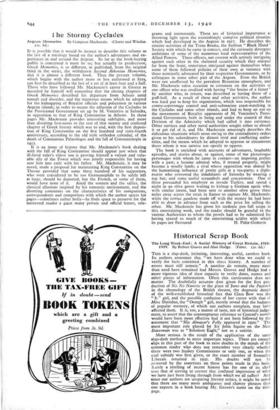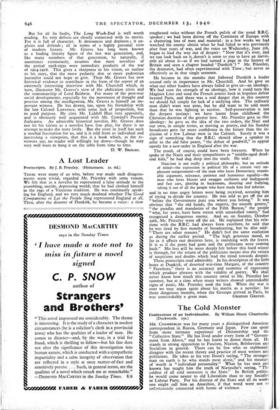Historical Scrap Book
The Long Week-End : A Social History of Great Britain, 1918- 1939. By Robert Graves and Alan Hodge. (Faber. 12S. 6d.) Tins is a slap-dash, irritating, interesting, useful, careless book. Its authors announce that "we have done what we could to verify the facts .contained in this shott history. A number of errors must still remain." A number do remain, many more than need have remained had Messrs. Graves and Hodge had a more vigorous idea of their capacity to verify dates, names and other pieces of information. Often this carelessness does not matter. The doubtfully accurate date given for the first pro- duction of No No Nanette or the place of Yuno and the Paycock in the chronology of the British theatre, the dogmatic denial of the well-established historical fact that Clara Bow was the " It " girl, and the possible confusion of her career with that of Miss Sheridan, the " Oomph " girl, merely reveal that the badness of popular memory, of which our authors complain, may have affected them. It is too, a matter of taste, not of historical judge- ment, to assert that the contemptuous reference to Conrad's novels would have been more effective had it not been followed by the statement that "His Almayer's Folly appeared in 5920." The most important role played by Sir John Squire on the New Statesman was as "Solomon Eagle," not as a satirist.
More serious is the result of the application of the same slap-dash methods to more important topics. There are enough slips in this part of the book to raise doubts in the minds of the common reader who does not remember very clearly whether there were two Sankey Commissions or only one, or when the coal subsidy was first given, or the exact number of Samuelite Liberals returned in 1931. His doubts will not he removed by the assertions on these points made in this book. Surely a retelling of recent history 'has for one of its chief uses that of serving to correct that confused impression of what we have just been living through from which we all suffer? And since our authors are unsparing literary critics, it might be noted that there are many more ambiguous and clumsy phrases than one expects in a book bearing Mr. Graves's name on the title- page. But for all its faults, The Long Week-End is well worth reading. Its very defects are closely connected with its merits. For it is full of character. It denounces and deplores ; it ex- plains and defends ; all in terms of a highly personal view of modern history. Mr. Graves has long been known as a leading literary figure of the last war generation, and, like many members of that generation, he naturally, if sometimes erroneously, assumes that most novelties of the period 1918-1930 were immediate products of the war of 1914-1918. This gives a sharpness to his vision, an outline to his story, that the mote pedantic don or more pedestrian journalist could not hope to give. Then Mr. Graves has new historical evidence to contribute in the form of the report of an extremely interesting interview with Mr. Churchill which, in turn, illustrates Mr. Graves's view of the abdication crisis and the statesmanship of Lord Baldwin. For many of the post-war social developments, especially for the movement of thought and practice among the intelligentsia, Mr. Graves is himself an im- portant witness. He has drawn, too, upon his friendship with the late Colonel Lawrence, with some lack of proportion, but to good purpose. He cites Mr. Liddell Hart very appositely., and is obviously well acquainted with Mr. Coward's Present Indicative. An admirable historical novelist, Mr. Graves does not let his talents as a novelist have free play, for there is no attempt to make the story lively. But the story in itself has such a morbid fascination for us, and it is told from so individual and interesting a viewpoint, that this is a book which, as the re- viewers say, no reader will willingly lay down—though he may very well want to bang it on the table from time to time.
D. W. BROGAN.











































 Previous page
Previous page